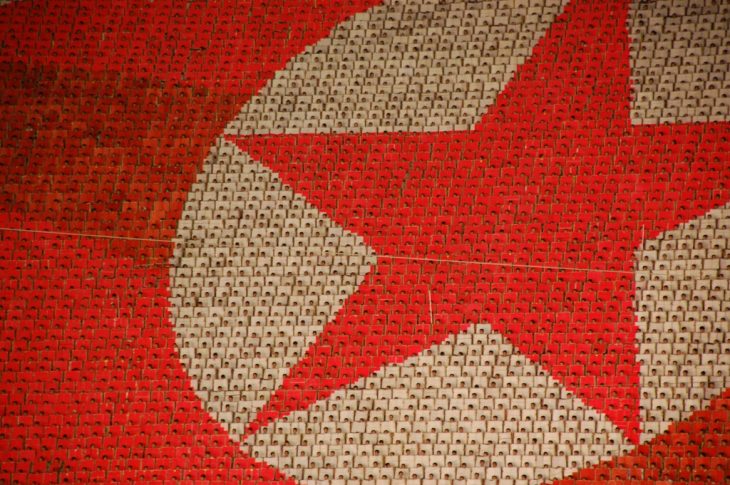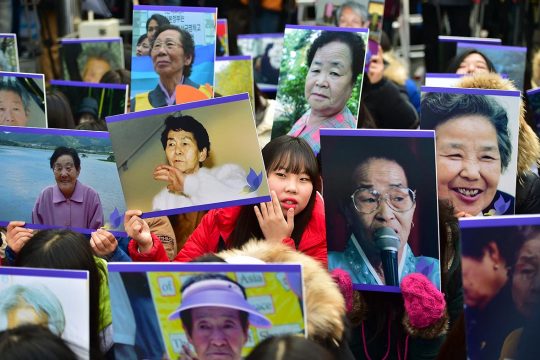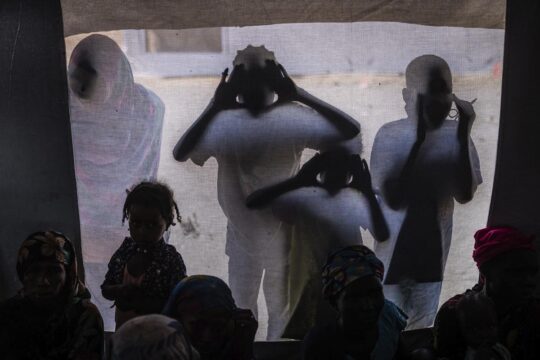In the wake of the UN Commission of Inquiry on Human Rights in North Korea, South Korea faces challenges in preparing for transitional justice ahead of regime change in the North and possible inter-Korean unification.
The soon-to-be Cold War powers orchestrating the division of the Korean Peninsula in 1945 could never have foreseen the decades of strife and tragedy that would soon unfold in the form of a devastating three-year war and the subsequent installation of dictatorships on both sides of the demilitarised zone. With imperial Japan defeated after thirty-five years of oppressive colonial rule, rival Korean factions engaged in a contest for legitimacy that resulted in the Sino-Soviet-backed regime in North Korea and the US-backed regime in South Korea. Although South Koreans lived under an authoritarian system for much of the ensuing period up until democratisation took hold in the late 1980s, the developmental dictatorship there was outshone in brutality by the leadership of the North which, under Kim Il Sung (leader from 1948-94), Kim Jong Il (1994-2011), and now Kim Jong Un (2011-), has been responsible for some of the longest-running and most horrifying human rights abuses the world has seen.
Accountability for North Korea on the horizon?
In 2013, international human rights advocates won a campaign pressuring the United Nations to establish a commission of inquiry (UN COI) on human rights in North Korea. The Commission reported its findings to the UN Human Rights Council (UNHRC) in March 2014, calling for urgent action to bring an end to the ongoing abuses. Shortly thereafter, the UNHRC issued a resolution which acknowledged for the first time the conduct of “crimes against humanity” and called for a Security Council referral of the situation to an “international criminal justice mechanism”. In September 2015, the UN Special Rapporteur on Human Rights in North Korea, Marzuki Darusman, re-affirmed that “It is now time to consider the concrete measures that should be taken to ensure accountability for those crimes and to set up a broader process of transitional justice.”
The response of South Korean civil society and foreign organisations has been a flurry of initiatives to explore the application of transitional justice to the Korean context in earnest for the first time. However, it has become clear that both state and society command a limited understanding of transitional justice as a concept and a set of legal and institutional mechanisms. The UN COI report demonstrated a commendable awareness of the particular challenges presented by the local landscape, and the COI’s varied recommendations – from accountability in the International Criminal Court to greater people-to-people engagement – encapsulated many of the aims and interests of different sides of the debate on North Korean human rights. Yet there is much work still to be done in overcoming the divisive nature of views on the topic, which have persisted since the 1990s when the scale of abuses first came to light. South Korea’s passing of its own North Korean Human Rights Act in March this year has placed additional pressure on government and civil society to move beyond entrenched lines of disagreement which have long hampered policy-making in this area. A further complicating factor affecting moves to develop local expertise and resources on transitional justice in South Korea is the overarching and persistent vision, both in policy and the national psyche, of unification of North and South Korea as inevitable, a reified object of national desire and the assumed context in which transitional justice would take place.
There are thus several sources of potential challenges to the pursuit of an effective transitional justice process that need to be addressed moving forward. The first is the increasingly obvious identity divide between North and South as two physical national collectives within a single, but only imagined, pan-Korean nation, which threatens to undermine the pursuit of a smooth and consensus-based unification process. The second is the ongoing struggle South Korea has faced domestically to overcome the stark conservative-progressive political divide, which is tied to differing views on how to treat North Korea and pursue unification, and which hampered past efforts at implementing transitional justice mechanisms in the form of truth and reconciliation commissions (TRCs). A final complicating factor is, of course, the unknowable future: how will transition ultimately take place and what are the implications of different transition scenarios, especially any which may not involve immediate North-South unification?
The Unification “Dream”
Since the end of the Cold War, much hope has been placed in the two Koreas emulating the German model of unification: overcoming the past and establishing a position of political and economic powerhouse in the Asian-Pacific region. Such potential is at the heart of South Korean government efforts to market unification to a public that is increasingly ambivalent on the issue, where only the very oldest members of society have any memory of pre-division Korea, and where more pressing concerns of daily life often take precedence over interest in unification with their oppressed brethren.
But unification should not be treated lightly, and must certainly be considered within practical concerns and practices of the current world. The vast economic cost of any unification process aside, the arrival of over 26,000 North Korean refugees in South Korea since the North Korean famine of the mid to late 1990s has highlighted stark differences in the habits, attitudes and experiences of the two peoples, resulting in what observers have described as a “hierarchy” of Korean-ness, manifested in the struggle many North Koreans experience when trying to adapt to life in the South and achieve social acceptance. Although inter-Korean unification has, as an ideal, significant psychological potential in healing the many wounds the Korean people have endured over the last century, the possible impact of the growing identity divide between the two national collectives in many areas of life cannot be underestimated. Deepening socio-cultural differences, particularly among a people who have long been taught that their ethnic homogeneity is a great national asset, would put significant stress on any process of justice taking place alongside the complex, expensive and inherently destabilising process of unifying two vastly different nation-states. Indeed, it raises questions about the limitations imposed on the implementation of transitional justice mechanisms which may be required to deal with over a hundred years of wrongdoing under multiple authorities.
Internal division
South Korea is anything but free from its own domestic problems in terms of gaining consensus on issues which would be crucial to any transitional justice process. The progressive-conservative ideological divide is a pervasive feature of the South Korean political landscape, broadly characterised by a strong progressive preference for challenging the legitimacy of past authoritarian rule. This political divide has been expressed within the North Korean human rights context with progressives arguing that involvement with human rights campaigning would be detrimental to inter-Korean relations, and the conservatives arguing that it should, in fact, be a central part of inter-Korean dialogue. The ideological divide is also highly palpable among the general population.
Against this backdrop, the Truth and Reconciliation Commission which ran from 2005-09 to address atrocities perpetrated by various authorities since 1910 struggled to achieve satisfactory outcomes. Initial political compromises made to allow the TRC’s establishment under the progressive leadership of Roh Moo Hyun led to vagueness in the legal infrastructure of the TRC process, which opened the door to political manipulation and hampered decision-making, especially after the return to conservative government in 2008. Sensitive to criticism of past rule, the conservative party attempted to weaken the TRC by limiting its powers and denying its value, while at the same time the TRC’s work was all but ignored in the conservative media. South Korea’s persistent difficulties with political consensus-building, particularly on issues related to North Korea and the Peninsula’s past (it took eleven years to reach agreement on the North Korean Human Rights Act passed this month), do not bode well for either a smooth unification process, or the swift and efficient institution of transitional justice in the future.
Preparing for justice in an unknowable future
It is rare for any state to have the opportunity to be prepared for justice and societal recovery in advance of a transition taking place, and South Korean civil society is keen to make use of momentum generated by the UN COI to focus attention on the possibilities offered by transitional justice in overcoming the national division. Yet, the fact remains that no one knows how or when a transition may take place, as long as the Kim dynasty holds on to power. As a consequence, the Koreas must be prepared for instability, uncertainty and a struggle to reach a point where the socio-political landscape exists to commence a transitional justice process. We cannot discount the possibility that unification of the two Koreas, and the manifold and deeply complex procedures, logistics, and national consensus that it would require, may demand the maintenance of two states, whether temporarily or long-term, to facilitate North Korea’s shift to an open, democratic setting more effectively, and to give time for the necessary socio-cultural adjustment to take place.
Conclusion
In light of the oft-overlooked but crucial role that South Korea has in any potential change in the North, external observers and stakeholders concerned with supporting the pursuit of accountability for human rights abuses must pursue close engagement with South Koreans on both sides of the political spectrum and with human rights organisations there. However, there is a limit to which the international community is able to assist the South in its preparations. The development of expertise, resources and institutions for transitional justice is ultimately a task the Korean people alone must achieve, and the momentum of the last several years since the UN COI has gone some way to pushing for the political conditions to make such progress possible. Although the prolonged suffering of the North Korean people is far from ideal, waiting for the “wall to come down” provides a crucial opportunity to anticipate the problems and possibilities the Peninsula will face when that long awaited day arrives.
Box:
Key actors and institutions
l United Nations Commission of Inquiry on Human Rights in the Democratic People’s Republic of Korea (UN COI): chaired by Michael Kirby, findings reported in March 2014.
l North Korea: An underdeveloped, authoritarian state of 25 million people, led by Kim Jong Un. Human rights abuses span the regime’s 70-year existence and range from mass imprisonment in brutal labour camps, torture and arbitrary killings, to denial of freedom of expression, movement and religion.
l South Korea: A developed democracy of 50 million people. The South Korean Ministry of Unification is engaged in a range of preparatory activities to try to plan for the day of unification.






